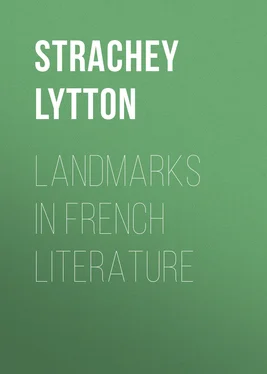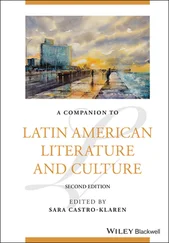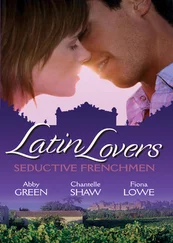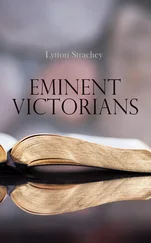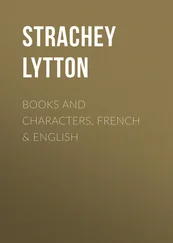Lytton Strachey - Landmarks in French Literature
Здесь есть возможность читать онлайн «Lytton Strachey - Landmarks in French Literature» — ознакомительный отрывок электронной книги совершенно бесплатно, а после прочтения отрывка купить полную версию. В некоторых случаях можно слушать аудио, скачать через торрент в формате fb2 и присутствует краткое содержание. Жанр: Языкознание, foreign_antique, foreign_prose, Зарубежные любовные романы, на английском языке. Описание произведения, (предисловие) а так же отзывы посетителей доступны на портале библиотеки ЛибКат.
- Название:Landmarks in French Literature
- Автор:
- Жанр:
- Год:неизвестен
- ISBN:нет данных
- Рейтинг книги:4 / 5. Голосов: 1
-
Избранное:Добавить в избранное
- Отзывы:
-
Ваша оценка:
- 80
- 1
- 2
- 3
- 4
- 5
Landmarks in French Literature: краткое содержание, описание и аннотация
Предлагаем к чтению аннотацию, описание, краткое содержание или предисловие (зависит от того, что написал сам автор книги «Landmarks in French Literature»). Если вы не нашли необходимую информацию о книге — напишите в комментариях, мы постараемся отыскать её.
Landmarks in French Literature — читать онлайн ознакомительный отрывок
Ниже представлен текст книги, разбитый по страницам. Система сохранения места последней прочитанной страницы, позволяет с удобством читать онлайн бесплатно книгу «Landmarks in French Literature», без необходимости каждый раз заново искать на чём Вы остановились. Поставьте закладку, и сможете в любой момент перейти на страницу, на которой закончили чтение.
Интервал:
Закладка:
Lytton Strachey
Landmarks in French Literature
CHAPTER I
ORIGINS—THE MIDDLE AGES
When the French nation gradually came into existence among the ruins of the Roman civilization in Gaul, a new language was at the same time slowly evolved. This language, in spite of the complex influences which went to the making of the nationality of France, was of a simple origin. With a very few exceptions, every word in the French vocabulary comes straight from the Latin. The influence of the pre-Roman Celts is almost imperceptible; while the number of words introduced by the Frankish conquerors amounts to no more than a few hundreds. Thus the French tongue presents a curious contrast to that of England. With us, the Saxon invaders obliterated nearly every trace of the Roman occupation; but though their language triumphed at first, it was eventually affected in the profoundest way by Latin influences; and the result has been that English literature bears in all its phases the imprint of a double origin. French literature, on the other hand, is absolutely homogeneous. How far this is an advantage or the reverse it would be difficult to say; but the important fact for the English reader to notice is that this great difference does exist between the French language and his own. The complex origin of the English tongue has enabled English writers to obtain those effects of diversity, of contrast, of imaginative strangeness, which have played such a dominating part in our literature. The genius of the French language, descended from its single Latin stock, has triumphed most in the contrary direction—in simplicity, in unity, in clarity, and in restraint.
Some of these qualities are already distinctly visible in the earliest French works which have come down to us—the Chansons de Geste . These poems consist of several groups or cycles of narrative verse, cast in the epic mould. It is probable that they first came into existence in the eleventh and twelfth centuries; and they continued to be produced in various forms of repetition, rearrangement, and at last degradation, throughout the Middle Ages. Originally they were not written, but recited. Their authors were the wandering minstrels, who found, in the crowds collected together at the great fairs and places of pilgrimage of those early days, an audience for long narratives of romance and adventure drawn from the Latin chronicles and the monkish traditions of a still more remote past. The earliest, the most famous, and the finest of these poems is the Chanson de Roland , which recounts the mythical incidents of a battle between Charlemagne, with 'all his peerage', and the hosts of the Saracens. Apart from some touches of the marvellous—such as the two hundred years of Charlemagne and the intervention of angels—the whole atmosphere of the work is that of eleventh-century France, with its aristocratic society, its barbaric vigour, its brutality, and its high sentiments of piety and honour. The beauty of the poem lies in the grand simplicity of its style. Without a trace of the delicacy and variety of a Homer, farther still from the consummate literary power of a Virgil or a Dante, the unknown minstrel who composed the Chanson de Roland possessed nevertheless a very real gift of art. He worked on a large scale with a bold confidence. Discarding absolutely the aids of ornament and the rhetorical elaboration of words, he has succeeded in evoking with an extraordinary, naked vividness the scenes of strife and heroism which he describes. At his best—in the lines of farewell between Roland and Oliver, and the well-known account of Roland's death—he rises to a restrained and severe pathos which is truly sublime. This great work—bleak, bare, gaunt, majestic—stands out, to the readers of to-day, like some huge mass of ancient granite on the far horizon of the literature of France.
While the Chansons de Geste were developing in numerous cycles of varying merit, another group of narrative poems, created under different influences, came into being. These were the Romans Bretons , a series of romances in verse, inspired by the Celtic myths and traditions which still lingered in Brittany and England. The spirit of these poems was very different from that of the Chansons de Geste . The latter were the typical offspring of the French genius—positive, definite, materialistic; the former were impregnated with all the dreaminess, the mystery, and the romantic spirituality of the Celt. The legends upon which they were based revolved for the most part round the history of King Arthur and his knights; they told of the strange adventures of Lancelot, of the marvellous quest of the Holy Grail, of the overwhelming and fatal loves of Tristan and Yseult. The stories gained an immense popularity in France, but they did not long retain their original character. In the crucible of the facile and successful CHRÉTIEN DE TROYES, who wrote towards the close of the twelfth century, they assumed a new complexion; their mystical strangeness became transmuted into the more commonplace magic of wizards and conjurers, while their elevated, immaterial conception of love was replaced by the superfine affectations of a mundane gallantry. Nothing shows more clearly at what an early date, and with what strength, the most characteristic qualities of French literature were developed, than the way in which the vague imaginations of the Celtic romances were metamorphosed by French writers into the unambiguous elegances of civilized life.
Both the Chansons de Geste and the Romans Bretons were aristocratic literature: they were concerned with the life and ideals—the martial prowess, the chivalric devotion, the soaring honour—of the great nobles of the age. But now another form of literature arose which depicted, in short verse narratives, the more ordinary conditions of middle-class life. These Fabliaux , as they were called, are on the whole of no great value as works of art; their poetical form is usually poor, and their substance exceedingly gross. Their chief interest lies in the fact that they reveal, no less clearly than the aristocratic Chansons , some of the most abiding qualities of the French genius. Its innate love of absolute realism and its peculiar capacity for cutting satire—these characteristics appear in the Fabliaux in all their completeness. In one or two of the stories, when the writer possesses a true vein of sensibility and taste, we find a surprising vigour of perception and a remarkable psychological power. Resembling the Fabliaux in their realism and their bourgeois outlook, but far more delicate and witty, the group of poems known as the Roman de Renard takes a high place in the literature of the age. The humanity, the dramatic skill, and the command of narrative power displayed in some of these pleasant satires, where the foibles and the cunning of men and women are thinly veiled under the disguise of animal life, give a foretaste of the charming art which was to blossom forth so wonderfully four centuries later in the Fables of La Fontaine.
One other work has come down to us from this early epoch, which presents a complete contrast, both with the rough, bold spirit of the Chansons de Geste and the literal realism of the Fabliaux . This is the 'chante-fable' (or mingled narrative in verse and prose) of Aucassin et Nicolete . Here all is delicacy and exquisiteness—the beauty, at once fragile and imperishable, of an enchanting work of art. The unknown author has created, in his light, clear verse and his still more graceful and poetical prose, a delicious atmosphere of delicate romance. It is 'the tender eye-dawn of aurorean love' that he shows us—the happy, sweet, almost childish passion of two young creatures who move, in absolute innocence and beauty, through a wondrous world of their own. The youth Aucassin, who rides into the fight dreaming of his beloved, who sees her shining among the stars in heaven—
Читать дальшеИнтервал:
Закладка:
Похожие книги на «Landmarks in French Literature»
Представляем Вашему вниманию похожие книги на «Landmarks in French Literature» списком для выбора. Мы отобрали схожую по названию и смыслу литературу в надежде предоставить читателям больше вариантов отыскать новые, интересные, ещё непрочитанные произведения.
Обсуждение, отзывы о книге «Landmarks in French Literature» и просто собственные мнения читателей. Оставьте ваши комментарии, напишите, что Вы думаете о произведении, его смысле или главных героях. Укажите что конкретно понравилось, а что нет, и почему Вы так считаете.
